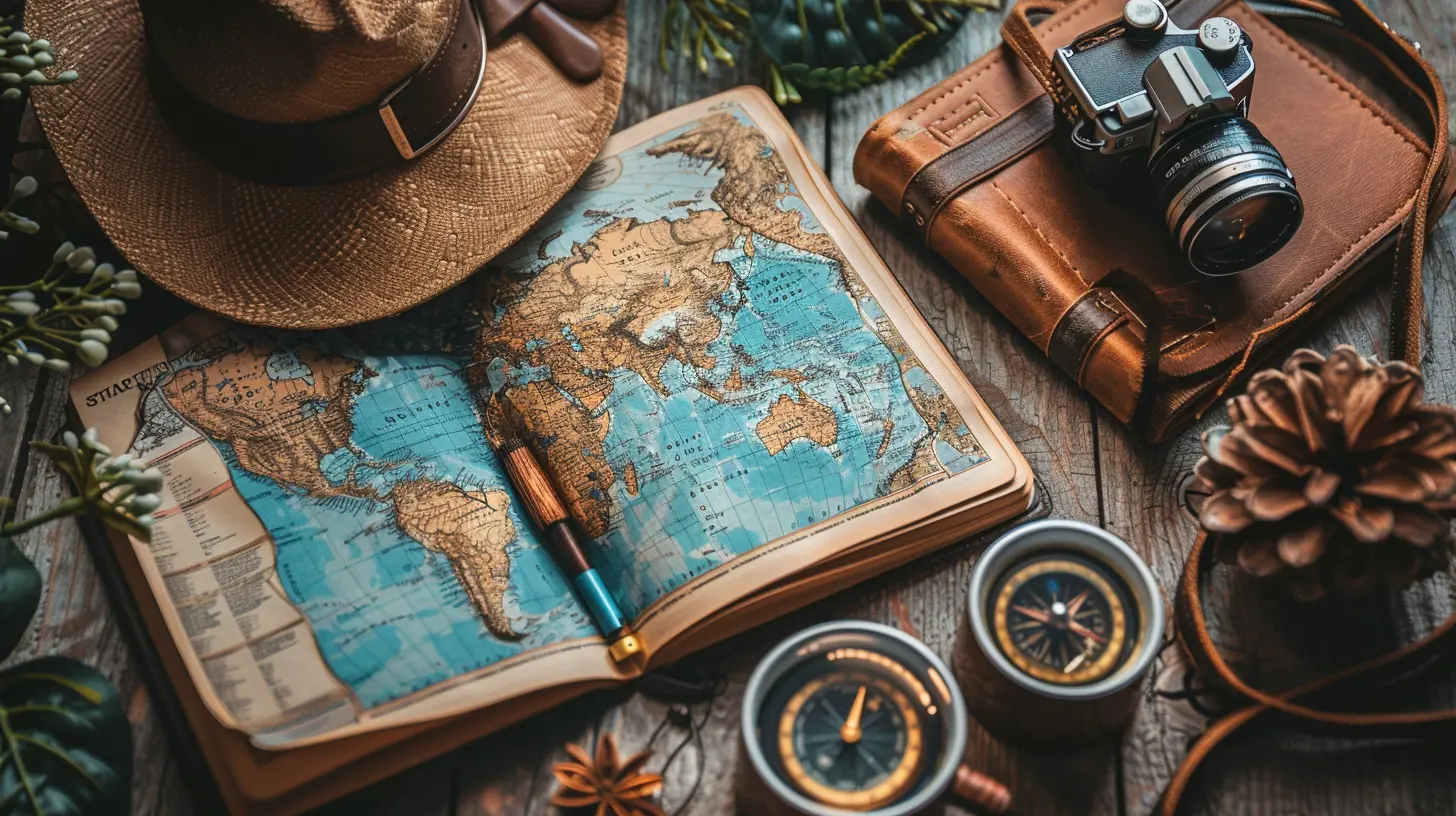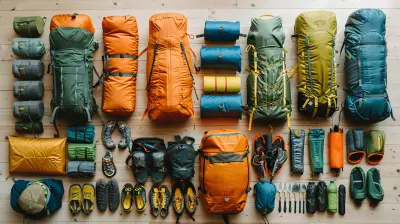How to Maintain Mental Wellness While Traveling Solo
9 October 2025
Traveling solo is an adventure that can be as empowering as it is exhilarating. It opens the door to new cultures, deeper self-understanding, and unforgettable experiences. But let’s be real—not every moment is sunshine and Instagram-perfect views. The emotional ups and downs of solo travel are real, and mental wellness can sometimes take a back seat if you're not being mindful.
So, how do you strike that balance between wanderlust and wellbeing? Let’s dive into how to maintain mental wellness while traveling solo—because your peace of mind deserves a first-class seat too.
The Beauty and Challenges of Solo Travel
Traveling alone gives you freedom like nothing else. You set the schedule, choose your destinations, and follow your whims without negotiating. Pretty sweet, right? But here’s the flip side: it can also feel overwhelming, lonely, and even anxiety-inducing at times.Being alone in an unfamiliar place, especially without your usual support system, can really test your mental and emotional strength. That's why keeping your mind healthy is just as important as booking the right hotel or packing the right shoes.
Why Mental Wellness Matters on the Road
Think of your mental wellness as your internal travel guide. When your mind is in a good place, you're more open to experiences, better at adapting to change, and more resilient when things (inevitably) go sideways—missed flights, language barriers, or even just feeling homesick.Taking care of your mind isn’t just a luxury—it’s essential. And maintaining balance doesn’t mean you can't have fun on your trip. In fact, it helps you enjoy it more.
1. Set Intentions (Not Just Itineraries)
We all love a good travel plan with sights to see and food to try, but what about emotional goals? Sounds woo-woo, but hang with me here.Before you set off, ask yourself:
- What do I want to get out of this experience emotionally?
- Am I traveling to escape something or to discover something?
Understanding your "why" gives purpose to your trip and keeps you grounded when the novelty starts to wear off. Whether it's personal growth, self-reflection, or just kicking back and relaxing, knowing your intentions can shape your mindset big time.
2. Embrace the Alone Time
Solo travel is basically a crash course in hanging out with yourself. That can sound awesome—or terrifying—depending on your usual lifestyle.Start small: grab a coffee alone without your phone. Sit at a park and people-watch. Journal your thoughts. These low-key moments of solitude strengthen your relationship with yourself.
Not every hour needs to be filled with activities or social interactions. Sometimes doing "nothing" is actually doing a lot for your peace of mind.
3. Keep Communication Lines Open
Just because you're physically alone doesn't mean you have to emotionally isolate yourself. Thanks to technology, staying connected is easier than ever.- Schedule regular check-ins with family or friends.
- Use apps like WhatsApp or Zoom to video chat when you're feeling off.
- Join travel communities or forums for real-time engagement with fellow solo adventurers.
You’d be surprised how comforting it is just to share your experiences—or even your struggles—with someone back home or someone who gets it.
4. Journal Your Journey—The Good, Bad & Weird
Travel comes with highs, lows, and “what just happened?” moments. Writing these down can be incredibly therapeutic.Journaling helps you:
- Process emotions
- Capture memories
- Spot patterns in your thoughts and feelings
You don’t need to write a novel. Just 5–10 minutes a day can boost your emotional clarity and reduce lingering stress. Plus, reading your own thoughts later gives you perspective that’s hard to get in the moment.
5. Stick to a Loose Routine
Yes, routine sounds counterintuitive to the free spirit of solo travel—but hear me out.This doesn’t mean a rigid schedule. It’s about weaving in small rituals that bring you comfort:
- Morning stretch or yoga
- A mindful cup of coffee
- A nightly gratitude list
These tiny routines give your day structure and your mind stability, especially when everything else feels new and unfamiliar.
6. Mind Your Mindset—It’s Not Always Rosy (And That’s OK)
Travel isn’t a nonstop highlight reel. There will be days when you miss home, get frustrated, or question why you even started this journey. That’s normal.When you're feeling low:
- Talk to yourself like you would a friend (compassion, not criticism)
- Allow yourself to feel the full range of emotions
- Reach out for support if needed—mental wellness apps, online therapists, and mental health hotlines are all options
Remember, being down doesn’t mean something’s wrong with you. It just means you’re human.
7. Get Moving—Literally
Exercise is one of the fastest ways to boost your mood and release stress. And you don't need a gym or a structured workout.Try these travel-friendly options:
- Walking tours
- Nature hikes
- Beach yoga
- Dance classes or local fitness sessions
Movement clears your head and boosts those feel-good chemicals. Plus, it’s a great way to explore a new place more mindfully.
8. Feed Your Body (And Your Brain)
What you eat impacts how you feel—big time. Travel often tempts us to indulge 24/7 (hello, carbs and cocktails), but try to aim for balance.Some quick tips:
- Stay hydrated (dehydration = fatigue and mood swings)
- Don’t skip meals (hangry is real)
- Carry snacks for energy dips
- Try local health foods to nourish curiosity and your body
A happy gut often leads to a happier brain, and they’re more connected than you think.
9. Celebrate Small Wins Daily
Traveling solo means you’re your own cheerleader. So celebrate the small moments:- Navigated public transport without a hitch? Win.
- Ordered food in a new language? Win.
- Took a risk and made a new friend? Big win.
Acknowledging these moments boosts your confidence and keeps your mental state in check. You're doing braver things than you give yourself credit for.
10. Know When to Pause
Sometimes, the best itinerary is no itinerary. If you’re starting to feel burned out or overwhelmed, hit pause.Delay the museum trip. Skip the bar crawl. Sleep in.
Giving yourself permission to rest doesn’t mean you’re wasting time—it means you’re being kind to yourself. And that kindness? That's what mental wellness is all about.
11. Create a Safe Place—Even on the Move
When you're constantly switching locations, developing a sense of home can be tricky. But with a little creativity, you can create a mental "home base" wherever you are.How?
- Pack personal comfort items (a playlist, a scented candle, a cozy sweater)
- Choose accommodations that feel safe and welcoming
- Return to familiar cafes or parks during extended stays
Repeated familiarity builds emotional safety. You’ll feel more anchored—even thousands of miles from home.
12. Don’t Shy Away From Help
If you’re dealing with serious anxiety or depression, please don’t try to tough it out alone just because you're traveling. Therapy doesn’t stop at the border.There are tons of online therapy platforms and real-time chat support options out there (BetterHelp, Talkspace, etc.). Many therapists also offer virtual sessions, so you can stay connected with your provider from anywhere.
Mental wellness needs don’t take vacation—and there’s no shame in asking for a hand.
Final Thoughts
Solo travel is like stepping into a mirror of your own soul. It reflects your strength, your vulnerability, your joy, your fears—all of it. And while it’s easy to plan flights, book stays, and make a list of places to eat, the real travel prep starts inside your own mind.Your mental wellness is not just something to keep in check—it’s the compass that guides your entire experience. So pack your bags, your dreams, and your self-care routine. You’ve got this.
And hey, even if you do hit a few mental potholes along the way, that doesn’t mean you're lost. It just adds depth to your journey.
all images in this post were generated using AI tools
Category:
Travel HealthAuthor:

Shane Monroe
Discussion
rate this article
1 comments
Azriel Newman
This article raises intriguing points about solo travel and mental wellness! I wonder, what specific techniques or practices have proven most effective for travelers in managing loneliness? Also, are there particular destinations that promote mental well-being more than others? Excited to learn more!
October 15, 2025 at 3:29 AM

Shane Monroe
Thank you for your comment! Techniques like journaling, joining local meetups, and practicing mindfulness can help manage loneliness. Destinations with community-oriented cultures, such as Bali or Costa Rica, often promote mental well-being. Stay tuned for more insights!


